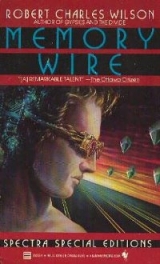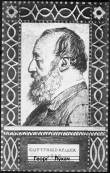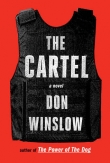
Текст книги "Memory Wire"
Автор книги: Robert Charles Wilson
Соавторы: Robert Charles Wilson
Жанры:
Научная фантастика
,сообщить о нарушении
Текущая страница: 10 (всего у книги 14 страниц)
CHAPTER 18
1. There was still the possibility of selling the stone. Byron was in no position to grow copies; he dared not risk even a visit to his basement lab in the Floats. They had only the single ’lith, and he was not sure how Teresa would feel about him selling it… but that was a problem he could deal with later. Right now they needed money.
He hired a canalboat and cruised until he found a functioning Public Works phone booth. The call code he thumbed in was private, but he was not surprised when it failed to enter. There was an ominous pause, then a Bell/Calstate symbol in crude pixels and the scrolling message: The number you have entered is out of service. Please hold and your call will be rerouted.
To the Agencies, Byron thought grimly. He hammered the Escape key and climbed back into his rented barque. Within minutes he was lost in traffic.
At a second booth deep in the factory district, he placed another call, strictly inside the Floats exchange: a friend, a local artist named Montoya. Cruz Wexler’s estate in Carmel was off the optic lines, Byron said, and did Montoya have any idea why?
Montoya became wide-eyed. “It was maybe a stupid idea to call him. You just back in town? The Agencies raided Wexler weeks ago. The building is closed up and his files are in custody.”
Byron considered. It must have happened shortly after they left for Brazil. Not, he thought, coincidence.
“They even raided some places in the Floats,” Montoya said. “Very rough time. Some good people were up in Carmel when the hammer came down.” He shook his head.
“They took Wexler?”
Montoya’s eyes narrowed; he licked his lips. “It’s not that I don’t trust you, right? But could be somebody asked you to ask.”
Byron took hold of the camera lens, forced it left and right on its rusted pivot. “Do you see anybody?”
“Ask Cat,” Montoya said, and cleared the monitor.
“Cat” Katsuma was a petite second-generation Floater who did crystal paintings for the mainland galleries. She had known Byron and Teresa for years; she expressed her pleasure at seeing him again. “I heard bad rumors,” she said. “I’m glad you’re okay.”
“Reasonably okay,” Byron said. “Tell me about Wexler.”
“You really need to talk to him?”
“It would clear some things up.” Though the prospect of money had retreated.
“Well. Meet me this afternoon, then,” and she named a cafe by the sea wall south of the factories.
He figured Wexler owed him—minimum—an explanation.
Running south in the rental barque, he totaled up everything he knew about Cruz Wexler.
Much of it was public knowledge. Wexler was, or had been, a celebrity. During the war years crystal ’liths had begun to circulate in the drug underground; they enjoyed a kind of vogue during which public curiosity had peaked. Wexler held a Ph.D. in Chaotic Dynamics but had been cashiered when he began publishing articles in which he described the dreamstones as “psychic manna from an older and saner civilization.” He lost his tenure but gained a following. He had been prominent in bohemian circles for a few years, had once owned property in the Floats. But the notoriety subsided and Wexler had pretty much retired to his estate in Carmel these days, fighting a progressive emphysema and playing wise man to the stubbornly faithful. He still had a following among the Float artists who drew their inspiration from the stones. Periodically they would make the migration to Carmel, bask in his presumed enlightenment. Byron figured it was pretty much all bullshit. But it was Wexler who had underwritten his lab, and it was Wexler—if anyone—who could make sense of the Pau Seco debacle.
He moored his boat at a by-the-hour dock behind the ruin of a cracking plant and walked to the cafe Cat had specified. It was a dicey neighborhood. Not terrible, but you got a certain influx from the slums farther south. Inside the chain-link perimeter he recognized Cat sitting at a high table overlooking the canal. A man was with her. The man had a Navy cap pulled down over his ears and a few days growth of beard, but it was Wexler; he was not hard to recognize. Byron, nervous and focused now, ordered a beer and carried it to the table.
“Byron,” Cat said warmly.
But he was staring at Wexler. Wexler said nothing, only returned the look. His eyes were steady and blue. Still a charismatic figure. People didn’t believe he could lie with eyes like that.
His breath rasped in, rasped out.
Cat stood up, sighing. “I’ll talk to you later, then.” She touched Byron’s shoulder, leaned over him. “Go easy on him, all right? I’ve been bunking him in my float. He’s got nowhere to go and his lungs are pretty bad.”
When she was out of earshot, Byron said tonelessly, “I have every reason to believe you fucked us over.”
Wexler nodded. “I can see how you might feel that way.”
“A walk, you said. A vacation.”
“Unforeseen circumstances,” Wexler said. “Is Teresa all right?”
“More or less.” He resented the question. “You have the stone?”
No, Byron thought. You are not entitled to that datum. Not yet. He smiled. “Worry about it,” he said.
Wexler sat back and sipped his coffee. “I’m not here,” he said at last—meaning the Floats, Byron took it—“by choice. You might have noticed.”
“Cat said you got burned.”
“They came in force. I was not expecting it.”
“But you weren’t home? That’s a pretty good coincidence.”
“I didn’t expect any of this. Or I would not have sent you people south. May I explain, or would you prefer to break my nose?”
Byron realized his fists were clenched. More bullshit, he thought bleakly. But he might as well listen. And he realized then that he had come here not for money or satisfaction, but for Teresa’s sake. Her unhappiness was patent and frightening and connected very closely with the stone. If anybody understood it, Wexler might.
A gull circled overhead, screeching. Byron tossed a crumb from the table and watched the bird chase it down to the dark canal water. “I’m listening,” he said.
The Agencies came and closed the estate, Wexler said. It was a radical sweep. They had always ignored him before. The dreamstones were technically contraband, but it was a law not much enforced; the scale of the crime was minuscule, and intensive enforcement would not have been cost-effective. “The new ’liths changed their mind,” Wexler said. “The deep-core ’liths.”
“You knew,” Byron said.
“I was warned,” he admitted. “I have my own contacts. Obviously.”
“Some good people were there.”
“There was no time to get them out. They’ve been in custody, but my understanding is that they’ll be released soon.” He sipped his coffee, labored for breath. “You have to understand about the stones.”
Wexler had a contact in the government research facility in Virginia, a highly-placed member of the research team who had been feeding him news about the deep-core oneiroliths. “And it was heady information. You have to understand that. It was everything we wanted. Everything that came before, impressive as it was, was blurred or obscure by comparison. For years we’d been decoding data in which every third bit had been erased by time. Reconstructing it, really. Even so, we learned a great deal. But never anything substantial about the Exotics themselves. As if they were holding themselves aloof, standing out of reach.”
But now, Wexler said, the data came in torrents. Too, the Virginia team had begun serious work with what they called “the human interface”—mostly convicts recruited out of Vacaville. This was not hard data; it was “of dubious provenance” and sometimes contradictory. But much of it correlated with the new translations from the big mainframes. A preliminary understanding of the Exotics began to emerge.
“The question had always been, why do we have these artifacts? Why were they buried in the Mato Grosso? Were they a gift, an accident? The great mystery.”
Byron said, “Is there an answer?”
“Hints,” Wexler said. He leaned forward now. His own fascination was obvious and undimmed. “We deciphered a little of their history. The history, especially, of their information technology.”
“I don’t understand,” Byron said.
“Well…” Wexler paused to catch his breath. “First there are the stories around the fire. Neolithic data storage. The past is recorded, but it’s not very efficient. Errors creep in. Then the written word. The beginning of real history—
a better grip on the past. Compared to oral history it’s a fairly dense medium, fairly incorruptible. Then the printed word, the book. Better yet. Photography, audiotape, videotape… and suddenly the past is very much with us. We have digital technology, we have molecular memory. We have people like you.” He looked a moment at Byron’s faded Angel tattoo. “Walking data storage. The Exotics were like us in this respect, but more focused… you might say obsessed. The idea of the loss of the past terrified them. They had a profound, ontological fear of forgetting. Without memory, no meaning; without meaning—chaos.” He sat back. “The oneiroliths are the logical product of that obsession: complexly folded in spacetime, linked somehow directly into sapient consciousness. You could say that they contain a sort of recording of experience itself, an archive of every human life since they arrived on this planet. Better perhaps to say that they allow us access to the experience of the past—the only kind of time machine we are ever likely to have.”
Well, Byron thought. He had seen Teresa do her trick with the old people who visited her float: pulling the past out of a stone. Strange but not world-shaking. He told Wexler so.
“But it begs the question,” Wexler said. “Our best estimate now is that the Exotics encountered our planet some thousand years before the birth of Christ. It fascinated them. It must have. They would have asked themselves the questions we’ve been asking about them: how are these creatures like us? How are they not?”
He sipped his coffee, momentarily breathless. Byron waited.
“My guess,” Wexler said, “is that they considered us defective. Suppose we traveled to another world and encountered a race of myopics. That’s how it must have seemed to them. Here we are, obviously sapient, tool-using, clever individuals. Our bodies are not unlike theirs; we have opposable thumbs, as they do. The distinguishing feature is …” He tapped his forehead. “Memory.” He smiled faintly. “The best evidence now suggests that the Exotics possessed what we would call eidetic memory. A human mind can’t do this; the few cases of human mnemonism on record have been deeply disturbed individuals. It’s the way we’re wired. We have to assume the Exotics could forget, in the sense that the past was not always vividly in their mind—no living creature could cope with that. But there was no fully experienced moment that could not be recalled at will… or could be willfully or permanently suppressed. Presumably, this is what fueled their obsession with information technology. For them, the idea of forgetting was indistinguishable from the idea of death. To pass out of memory was to pass out of the world. To conserve memory was to confer immortality.”
Byron walked with Wexler out along the seawall for a distance.
It was more private out here. The ocean seemed to lend a credibility to all this talk of time, immortality, memory.
Byron believed most of it. The talk had ignited an old enthusiasm in Wexler’s lined face, too immediate to be faked. None of this addressed the problem of betrayal, money, Teresa. But he was content, for now, to let the man talk.
“I wanted one of these new stones, of course. It seemed to me we could do so much with it. They used human subjects in Virginia, but usually the criminally insane, and they were reacting badly to the experience—hypermnesia, specifically of repressed material. Whereas in Carmel the response was almost always positive … at least with the traditional ’liths. Why not these new ones? It would be bigger, stronger, better. Real contact this time. Contact with an alien sapience: I cannot communicate how intoxicating that idea was. Not the exchange of mathematics, but real contact—spiritual contact.”
Byron said coolly, “Spiritual?”
The faint smile again. “I used to be freer with words like that. But yes, spiritual. It was what we wanted. The authentic touch. Across that chasm.” He waved his hand at the sky. “But of course everything was locked up very tight. The Agencies were scared of this whole thing. For the last thirty years national governments have been presiding over some fairly tumultuous social changes. A direct product of the oneiroliths. Fortunes made and unmade. That kind of instability is frightening. The idea of accelerated change—well, it made them nervous.”
“So you set up the buy at Pau Seco.”
“I really believed it would be safe. I spent a considerable amount of money on it. I bought cooperation at the highest levels of the SUDAM bureaucracy. There was a risk involved, of course. I told Teresa so when she volunteered. But even if there had been legal trouble, I might have bought you out of that too … the Valverde regime is extremely pliable.”
“It was worse than that,” Byron said.
Wexler averted his eyes. “So I understand. My contact in Virginia was compromised. And then the estate at Carmel was compromised. And so the house of cards came tumbling down. I have no influence over the Agencies … I didn’t know they would be involved.” He looked at Byron. “You managed to get away with the stone?”
“Yes.” No point in hiding it now.
“You have it still?”
He nodded.
“Has Teresa used it?”
“Yes.”
“Her reaction was not positive?”
“No,” Byron said.
Wexler nodded, registering the information. He looked back at the sea. The sea was wide and deep, Byron thought, and it went on forever. Like the sky. Like the stars.
“I don’t think they wholly understood us,” Wexler said. “The Exotics, I mean. They gave us the stones, and they were a gift, hidden until we could usefully decode and reproduce them. Binary code propagating across axes of symmetry. Micro voltages trickling down folded spacetime. But with this other aspect…” He smiled again—sadly now, Byron thought. “ ‘Spiritual.’ I think they simply wanted to make us whole … to cure what they saw as our tragic failure. Failure of memory. Which is failure of conscience. They were surprised, I would guess, by our capacity for aggression. For ruthlessness, for inflicting pain. Conscience is memory… and the stones would restore it.”
“But it doesn’t work that way.”
“I think because we are divided against ourselves in a way they could not imagine. We suppress memories; the memories lead a life of their own. We create images of ourselves and the images spring to life. We have names for them. The conscious and unconscious mind. Id and ego. And so on. Always, the crucial act is the act of forgetting. To be forced to confront the past, really confront it…” He shook his head. “It would take a great strength.”
“I’m worried about her,” Byron said.
Wexler said quietly, “I can’t help you.”
The sun was low in the sky when they turned away from the ocean.
“If you had the stone,” Byron said, “if you had it now, what would you do with it?”
Wexler moved like an old man. In this light, he was not inspiring. He walked with his legs bowed, his head down. “I don’t know,” he said.
“Would you touch it?”
“I don’t know … I don’t think so.”
“Why not?”
He was a long time answering. His lips were pursed, his gaze abstracted. “Maybe,” he said, “there are things I would like not to remember.”
“Like what?”
Silence.
Byron said, “You were the only one who knew. You were the one who sent us to Pau Seco, and you were the one who made the arrangements. Nobody else knew.”
His voice was faint now, tremulous. He said, “Suppose I lied. Suppose I was arrested in the sweep. Suppose I was interrogated by the Agencies.” He closed his eyes. “Suppose I was afraid, and suppose that—because I was afraid—I confessed, I told them about the arrangements I’d made in Brazil. And suppose, because I told them, they let me go.” His smile now was bleak and humorless. “Wouldn’t that be something I might like to forget?”
By the time they reached the cafe, night had fallen, the air was cool, and most of the tables were empty. Wexler ordered a drink; Byron said he had to get going.
“I can tell you one thing that might be useful,” Wexler said.
Byron waited. The beaten look on Wexler’s face had begun to make him nervous.
“I still talk to people at the Virginia facility,” he said. “There are a few untapped bit streams, if you know where to find them. The news now is that the Agencies have cooled off a good deal. The stone left Pau Seco, and they are not interested in tracing it. They decided it doesn’t have a big future on the black market-^-and from what you say, that is probably true. The issue is dead, except that they’ll install a military force at Pau Seco to oversee the Brazilians.
“But you may have a problem yet. There was a man at the Virginia facility, an Agency man, a latent sociopath from the war years. His name is Stephen Oberg. He was in charge of the Pau Seco interdiction. Word is that he has an obsessive personal fear of the oneiroliths… and that he went rogue after the stone left Brazil.” Wexler peered at him, wheezing faintly. “He may still be on your case.”
“Oberg,” Byron said. The name was faintly familiar. It called up some sinister echo.
Wexler sat down among the shadows. He pulled his collar up, as if against a chill only he could feel. “Rumor has it,” Wexler said, “the man is quite insane.”
2. Byron navigated his rental barque home through the night canals now, past neon-lit dance shacks and constellations of paper lanterns.
He was mindful of the Angel tattoo on his arm: Wexler had mentioned it. He had spent so much time, he thought, trying to erase it. Not the symbol but the thing, the fact, what he had become in the war.
What he had told Keller back in Belem was true. He did not want to be a machine; he understood that he had become a machine; he understood that the road back into the world was treacherous and painful. Teresa was his road. All he had ever wanted was a life with her. That would be enough. But if not that, then at least the scars of humanity: the pain of a commitment he could not revoke.
The question he entertained now, for the first time, was: when is it enough?
How much pain is proof? How much is too much?
I could disappear, he thought. I could buy documents and disappear into the mainland. Leave the Floats, leave the dream trade, leave no trail for this Oberg to follow. Make some new life and disappear into it, maybe find a woman who might love me, he thought, and make babies with her. The old tattoo had pretty much faded. A sleeve was enough to cover it.
It was an intoxicating thought, but also dangerous. He forced it away as he docked the boat. Too much unfinished business. She needed him yet. There was still the possibility he could do something for her.
The balsa was dark inside. Pushing through the door, he heard a moan from the back bedroom.
He flicked a wall switch; an antique incandescent bulb radiated sterile and sudden light. “Teresa?” But she only moaned again. The sound might have signified pain or pleasure.
He pushed through a rag curtain into the back room.
She was alone on the bed, blinking at the light. Her pupils were massively dilated.
Byron picked up the small wide-necked bottle from the floor beside the bed. It was three-quarters full of tiny black pills. Enkephalins, he thought. Concentrated, potent. “My Christ,” he whispered.
Her moan was abstracted pleasure. She was obviously ashamed—in some corner of her mind—that he had found her this way. She averted her face. But the shame could not override the flush of chemical well-being. There were pinpricks of sweat on her forehead.
Hardly aware of himself, he sat on the bed and cradled her head against him.
She rolled away. “I’m sorry,” she said. Her voice was faint, hollow, oceans distant. “I’m sorry. I’m sorry.”
But there was nothing to say. Nothing worth saying.
He held her, and the boat rose in the swell.








